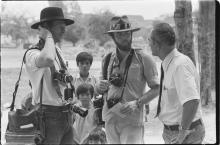
The permanent exhibition galleries at the Gerald R. Ford Presidential Museum in Grand Rapids, Michigan, allow visitors to explore key moments in President Gerald R. Ford and First Lady Betty Ford's lives and careers. Visitors learn about the impact of democratic citizenship through visually captivating displays and models, archival photography, sculptures, clothing, and other exhibits. Visitors can also visit a temporary exhibit gallery, which features a changing array of temporary and traveling exhibits on a wide range of subjects.
The Gerald R. Ford Presidential Library in Ann Arbor, Michigan, features a permanent timeline exhibit on the lives of Gerald and Betty Ford, along with several small temporary exhibits each year.

Casting Light: Photographs of the Vietnam War
Library - Ann Arbor
On-Site
-
2025 marks the 50th anniversary of the end of U.S. involvement in Vietnam. This exhibit uses photographs to provide a moving, intimate, and powerful look at the Vietnam War, capturing how presidents grappled with the reality of war and the American public’s changing responses to the conflict. Visitors can explore the history of the war and view iconic prints from American photojournalists.